Qatar 2022: 'Forced labour' at World Cup stadium
- Published
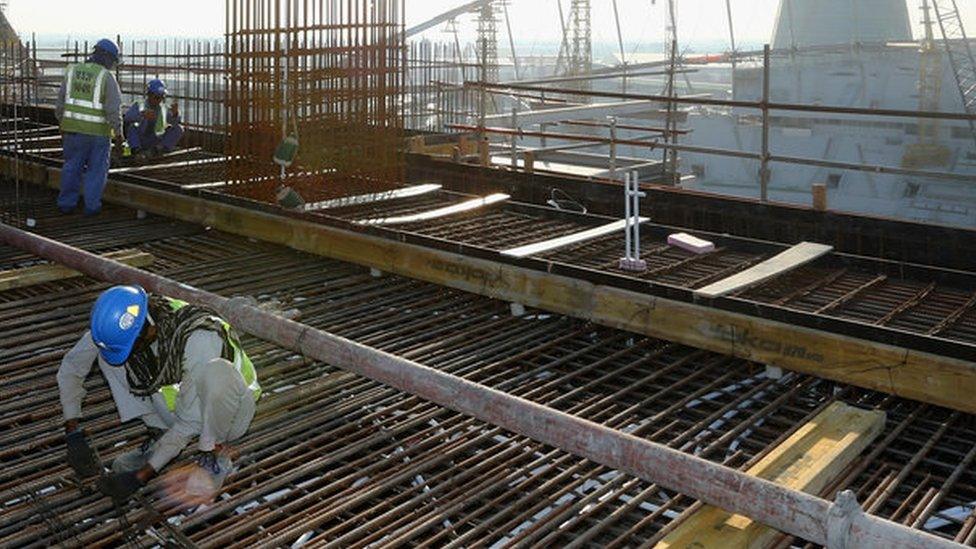
Amnesty said the Qatar government was "apathetic" about preventing abuses
Rights group Amnesty International has accused Qatar of using forced labour at a flagship World Cup 2022 stadium.
Amnesty says workers at Khalifa International Stadium are forced to live in squalid accommodation, pay huge recruitment fees and have had wages withheld and passports confiscated.
It also accuses Fifa of "failing almost completely" to stop the tournament being "built on human rights abuses".
Qatar said it was "concerned" by the allegations and would investigate.
The government said the welfare of migrant workers was a "top priority" and insisted it was committed to systematic reform of Qatar's labour laws.
Fifa, the governing body of world football, said measures had been taken that had already improved the situation for migrant workers.
Migrant workers describe 'pathetic' conditions
Have 1,200 World Cup workers really died in Qatar?
Arrested for reporting on Qatar's World Cup labourers
Last year the country pledged to makes changes to its "kafala" sponsorship system, under which migrant workers cannot change jobs or leave the country without their employer's permission.
But Amnesty warned the proposed reforms would make little difference and said some of the workers were enduring a "living nightmare".
"All workers want are their rights: to be paid on time, leave the country if need be and be treated with dignity and respect," said general secretary Salil Shetty.
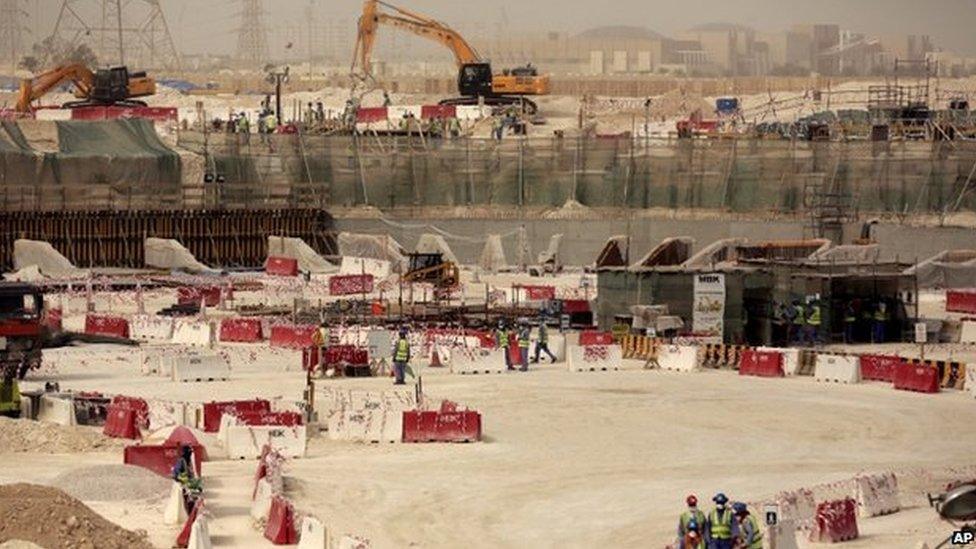
Abuses of World Cup workers is a "stain on the conscience of world football", Amnesty said
Amnesty interviewed 231 mostly South Asian migrants - 132 working at the stadium and 99 on green spaces in the surrounding Aspire sports complex.
It said staff of one labour supply company used the threat of penalties to exact work from some migrants such as withholding pay, handing workers over to the police or stopping them from leaving Qatar.
This amounted to forced labour under international law, Amnesty said.
The Qatari government said its Ministry of Administrative Development, Labour and Social Affairs would investigate the contractors named in the report.
But Amnesty said every migrant it had interviewed had reported abuses of one kind or another, including being:
required to pay fees of up to $4,300 to recruiters in their home country to get a job in Qatar
deceived over the type of work and the pay on offer, which was sometimes half as much as they were promised
threatened for complaining about their conditions
One metal worker from India who worked on the Khalifa stadium refurbishment told Amnesty he was threatened by his employer when he complained about not being paid for several months.
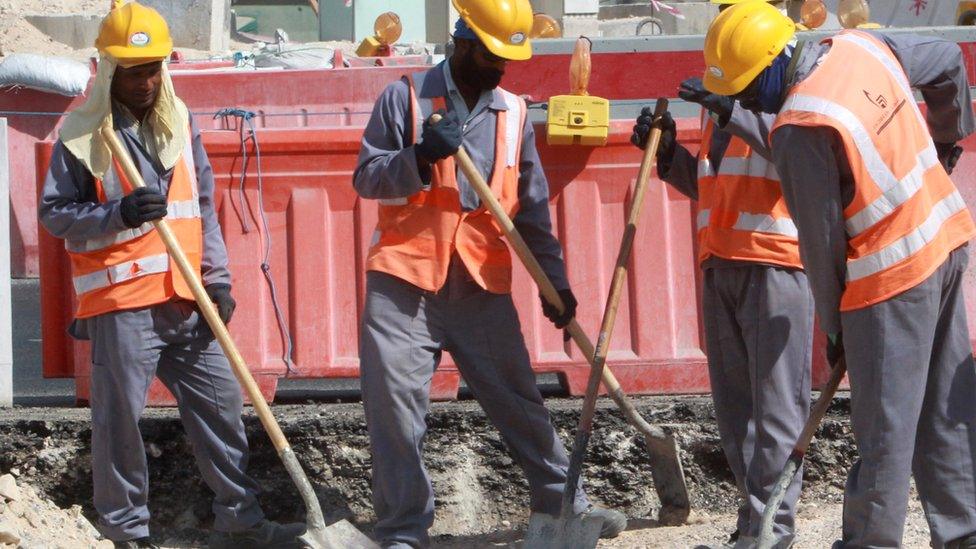
Qatar's government says it is committed to labour reform
"He just shouted abuse at me and said that if I complained again I'd never leave the country," the worker said.
"Ever since I have been careful not to complain about my salary or anything else. Of course, if I could I would change jobs or leave Qatar."
Another metal worker from Nepal said his life was "like a prison".
Some of the Nepali workers told Amnesty they were not allowed to visit their families after the earthquake last April that killed thousands and left millions displaced.
Hassan al-Thawadi, Secretary General for Qatar's Supreme Committee for Delivery and Legacy, which is responsible for delivering stadiums and infrastructure for the games, told the BBC that addressing the issue of workers' welfare was a "long journey".
"We cannot resolve everything overnight," he said.
"Progress has been made on the ground in relation to a number of these issues. In addition, I think the report indicates the commitment the Supreme Committee has made in relation to workers' welfare and our standards, as well as the openness and transparency with which we have dealt with these matters."
Mark Lobel reports: ''Our arrest was dramatic - eight cars drove us off the road''
'Fifa indifference'
Mr Shetty also had harsh words for Fifa, accusing it of "indifference" to the abuse of migrant workers, which he said was a "stain on the conscience of world football".
The Khalifa Stadium is part of the Aspire Zone sports complex, where facilities have already been used by some of the world's biggest football clubs, including Bayern Munich, Everton and Paris Saint-Germain, which trained there in the winter.
Amnesty has called on big World Cup sponsors such as Adidas, Coca Cola and McDonald's to put pressure on Fifa to tackle the issue.
"It is time for football's leaders to speak out or be tainted by association," Mr Shetty said.
World Cup 2022: Concern for migrant workers in Qatar
Could Qatar lose its World Cup?
It wants Fifa to get Qatar to publish a comprehensive reform plan before construction on World Cup projects peaks in 2017.
It also wants Fifa to carry out its own inspections of labour conditions in the Gulf state.
The numbers working on World Cup sites are set to rise tenfold to around 36,000 in the next two years, Amnesty said.
Fifa released a statement on Thursday saying that since 2011 it had been meeting key groups, including Amnesty International, to discuss "consistent and sustained implementation of fair working conditions" on world cup sites.
Fifa said: "This is an ongoing process. Challenges remain, but Fifa is confident that the structures and processes set-up so far by the Supreme Committee for Delivery and Legacy, which is the entity responsible for the delivery of Fifa World Cup infrastructure, provide a good basis to monitor labour rights of migrant workers."
Fifa's head of sustainability, Federico Addiechi, said measures taken by the committee "have already improved the situation for migrant workers".
Correction 31 March 2016: An earlier version of this story showed a picture of an Aecom employee at a Qatar construction site without making it clear the company does not work, nor has any employees, at Khalifa International Stadium.
- Published6 June 2015
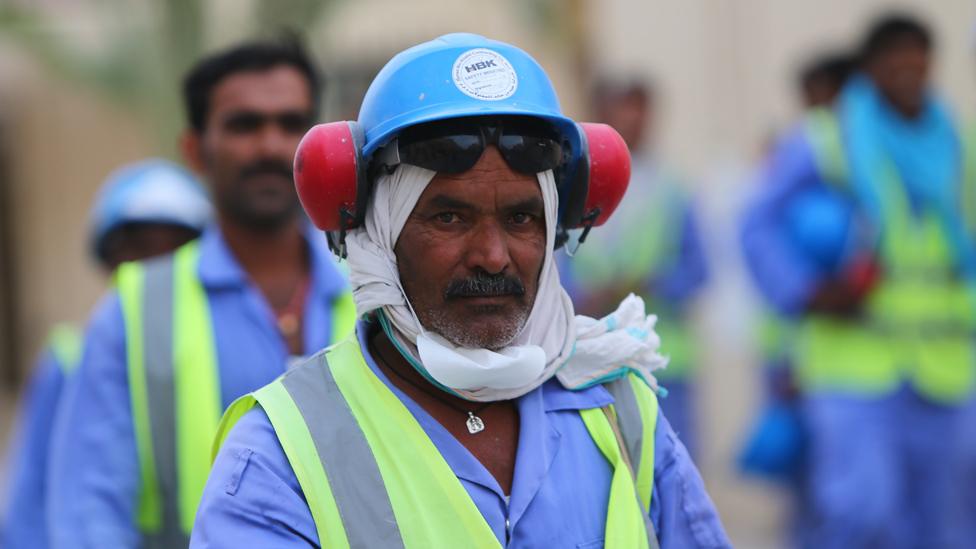
- Published21 May 2015
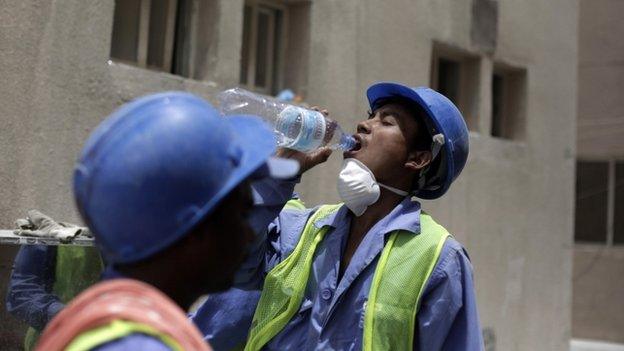
- Published18 May 2015
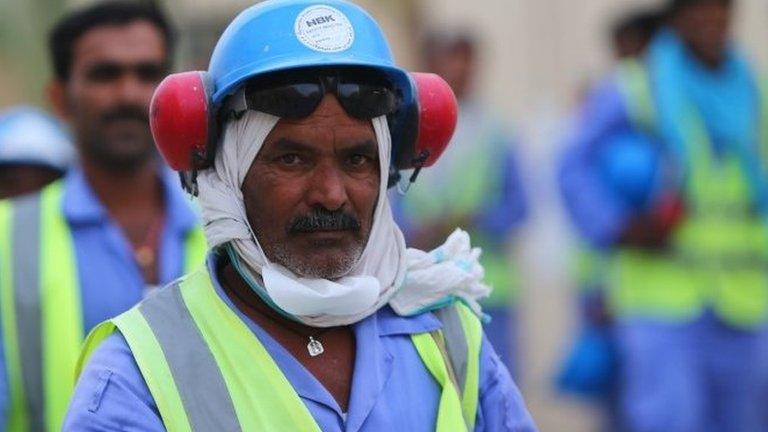
- Published8 June 2015
